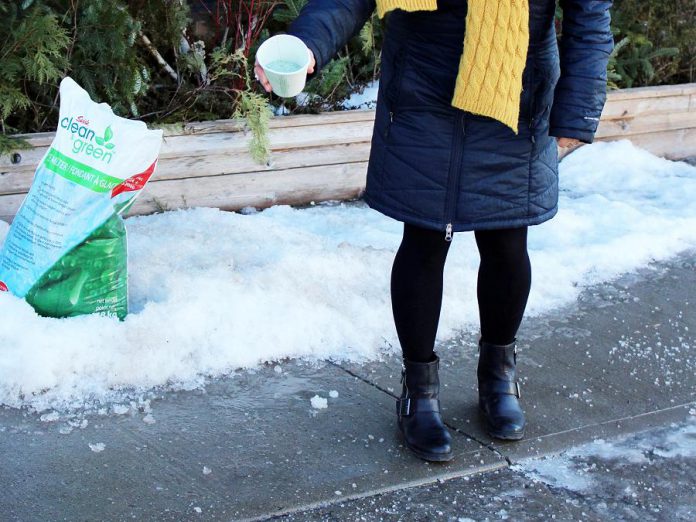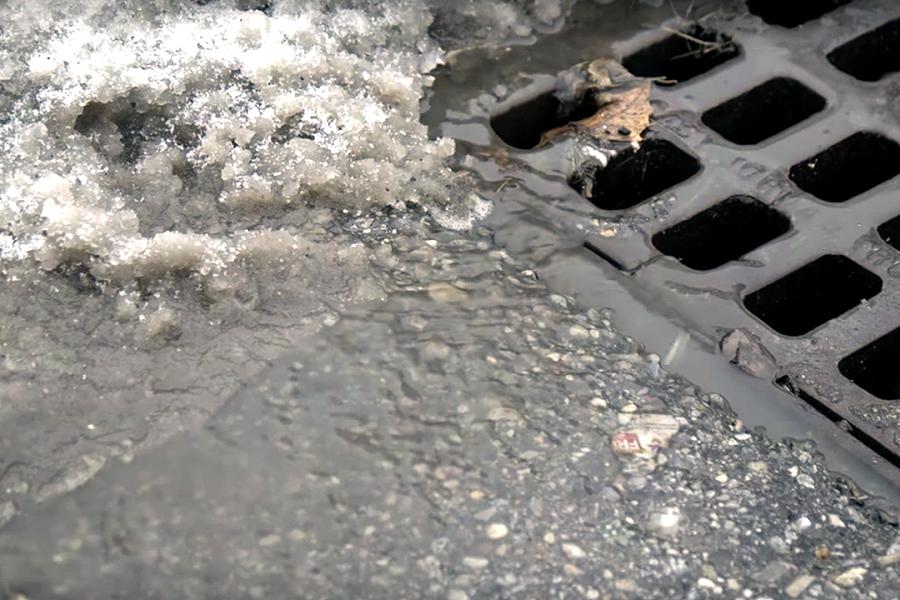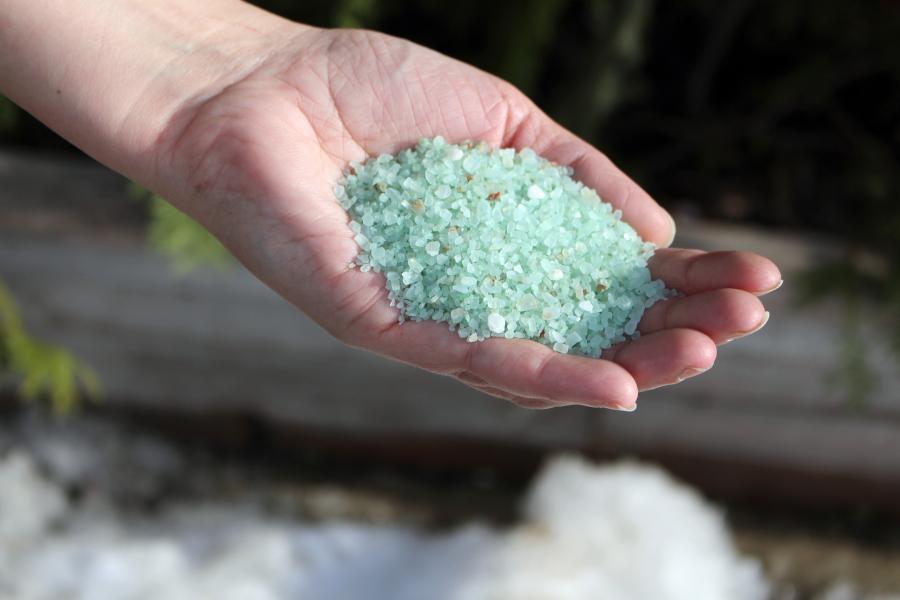 Rather than spreading salt around your property, consider more environmentally alternatives like sand, non-clumping kitty litter, or even fireplace ashes. The GreenUP Store also carries Clean and Green Ice Melter by Swish, an ice-melter that's gentle on vegetation, concrete, water, and floors. It's not corrosive and is completely safe to handle with bare hands, so it's safer around children and pets too. It also more effective than salt when it's extremely cold, as it will continues to melt ice at -22° C. (Photo: Karen Halley)
Rather than spreading salt around your property, consider more environmentally alternatives like sand, non-clumping kitty litter, or even fireplace ashes. The GreenUP Store also carries Clean and Green Ice Melter by Swish, an ice-melter that's gentle on vegetation, concrete, water, and floors. It's not corrosive and is completely safe to handle with bare hands, so it's safer around children and pets too. It also more effective than salt when it's extremely cold, as it will continues to melt ice at -22° C. (Photo: Karen Halley)
We waited long enough for its arrival and now that it’s here, let’s hope the snow is here to stay — at least for a while!
While the snow makes the landscape look lovely this time of year, and many winter enthusiasts are happy to finally be hitting the ski slopes and trails, getting around can be stressful in snowy and icy conditions.
Unfortunately, up-and-down temperatures along with freeze and thaw tendencies of our recent winters seem to leave us with sheets of ice hiding between layers of snow.
The slush that comes along with intermittent rain freezes into thick, icy mounds making walkways challenging to navigate and some roads, sidewalks, and driveways deceptively slippery.
 Salt accumulates on roads and in snow banks and is then washed into storm drains during thaws. Responsible spreading of salt by homeowners can reduce the amount of salt washed into storm drains and into our waterways.
Salt accumulates on roads and in snow banks and is then washed into storm drains during thaws. Responsible spreading of salt by homeowners can reduce the amount of salt washed into storm drains and into our waterways.
Salt (sodium chloride) is commonly used for reducing the amount of ice around homes, on sidewalks, and on many commercial properties. It is relatively inexpensive and it works quickly to break up ice, making it easier to clear, but there are many reasons to rethink its use around your home or office.
Before you bring out the salt, consider its impact on your property, your pets, and the environment.
Salt is corrosive and can cause damage to vehicles and bikes. It is easily tracked inside on the treads of boots causing damage to footwear, carpets, rugs, and flooring. If you have pets, salt can irritate paws and it can be harmful if ingested.
 Five million tonnes of road salt is used in Canada each year to keep our roads safe during winter conditions; undoubtedly this has reduced the number of vehicle accidents, but it does come with a cost to the environment.(Photo: Karen Halley)
Five million tonnes of road salt is used in Canada each year to keep our roads safe during winter conditions; undoubtedly this has reduced the number of vehicle accidents, but it does come with a cost to the environment.(Photo: Karen Halley)
Salt impacts your gardens too. It can raise the pH of your soil and make it less fertile. The health of trees, shrubs, grasses, and plants that line salted driveways and walkways can deteriorate if the concentration of salt becomes too high. Root systems are easily damaged by salt, making uptake of water difficult for plants. The drought-like conditions created by excess salt causes plants to dry out.
Spreading sidewalk salt can have a negative effect on your property, but it is also important to recognize that the impacts extend beyond your yard.
Salt dissolves in water, which means that it is easily carried into groundwater. Once the spring thaw and April showers hit, salt runs off into storm sewers increasing concentration in our waterways, and affecting plants and animals in our rivers, streams, and lakes.
“The increased salinization of freshwater waterways is a growing concern for many areas of Ontario,” explains Heather Ray, GreenUP’s manager of water programs.
“Salt interacts with the bonds between heavy metals and sediments, which can increase harm to aquatic species. Salt can block the movement of oxygen into deeper, cooler water, impacting aquatic species such as lake trout.
“In some locations within Ontario, saltwater species are being found in freshwater areas because of the water’s high salinity. High salt levels in water can also impact drinking water.”
According to Back to Basics: Clean Water, a recent report by the Environmental Commissioner of Ontario, Back to Basics: Clean Water,” in 2017 the Town of Simcoe experienced high salt levels in the town’s drinking water, which resulted in the Haldimand-Norfolk health officer to issue a “do not consume” warning for people with high blood pressure and sodium-restricted diets.
It’s very concerning to think that all the road salt use throughout the season could cause such a drastic impact. In the City of Peterborough, straight salt is used on all arterial and collector streets only when weather conditions and temperatures allow for its use, and a mix of sand and salt is used on all of our residential streets.
“The responsible use of salt lays within the hands of all that use it,” says Brian Jobbit, the City of Peterborough’s manager of public works. “Our fleet of trucks is equipped with plows and material spreaders that are all computer-controlled for application rates based on the material being spread.
“The application rates for salt are reduced in accordance with our source water protection zones and we report our salt usage annually to Environment Canada. Each year we retrain all of our staff on winter control techniques and the application of materials at the right time, right rate, and right place so we stay diligent in the use of our winter materials, such as salt.”
 A mixture of salt and sand (called pickle) is often applied to roads to melt ice while improving traction. In the City of Peterborough, snow plows are equipped with computer controlled application rates for these materials to optimize their use according to set standards. (Photo: Karen Halley)
A mixture of salt and sand (called pickle) is often applied to roads to melt ice while improving traction. In the City of Peterborough, snow plows are equipped with computer controlled application rates for these materials to optimize their use according to set standards. (Photo: Karen Halley)
Approximately five million tonnes of road salt is applied in Canada each year. Undoubtedly, this has reduced the number of accidents and injuries associated with icy winter conditions but this comes with a cost to the environment. We expect that climate change will bring more extreme weather and unfortunately, it has been shown that chloride concentrations are higher in years with more precipitation and total snow depth.
“Salt is a relatively low concern for our local waterways,” Ray adds. “But as the water within our watershed flows downstream to Lake Ontario, the accumulation of salt creates concern for other waterways and communities. Reducing the amount of salt we use in our area can go a long way to reduce salt in the waters that we share with our neighbours.”
There are many products on the market that work much like salt, but without the environmental impacts. On a large scale, many municipalities are opting for salt alternatives when de-icing roadways. Several cities in Quebec use an organic spray made from sugar beets to remove ice from roads.
For years, Toronto has also used the same beet mixture to de-ice roads. The solution is more expensive but it has less impact on the environment and is used when temperatures dip below the point of salt’s effectiveness, which is at -10° C; the beet solution works to -32° C.
For around your home, there are many alternatives to salt that can help to improve slippery conditions. Sand is a common alternative that creates traction in icy areas. Non-clumping kitty litter and fireplace ashes are also great substitutes. Just be sure not to track them indoors where they can make a mess.
 Clean and Green Ice Melter by Swish, an environmentally friendly alternative to salt, is available at the GreenUP Store at 378 Aylmer St. N. in downtown Peterborough. (Photo: Karen Halley)
Clean and Green Ice Melter by Swish, an environmentally friendly alternative to salt, is available at the GreenUP Store at 378 Aylmer St. N. in downtown Peterborough. (Photo: Karen Halley)
The GreenUP Store (378 Aylmer St. N., Peterborough) carries a product called Clean and Green Ice Melter by Swish that is gentle on vegetation, concrete, water, and floors. It is not corrosive and is completely safe to handle with bare hands, so it’s safer around children and pets, too. This product continues to melt ice below -22° C, so it has the capacity to work at the cold temperatures we experience in the Kawarthas, and beyond the effectiveness of salt.
Whatever you are spreading at home or work, a little will go a long way. Use any de-icing product sparingly and give it time to work. Be sure to shovel first to reduce the need to spend money on additional products. Ensure your downspouts are directed away from paths and driveways to prevent puddling and subsequent ice spots from forming. If you must use salt, you only need one handful (about 20 grams) per square metre of area, so use it sparingly.
Enjoy the beauty of winter and whether you’re on the road, the trail, the sidewalk, or the front stoop, slow down and take time to consider the best solutions for winter snow and ice removal that safeguard our gardens, help wildlife, and protect our water.
